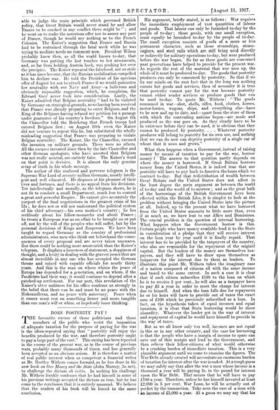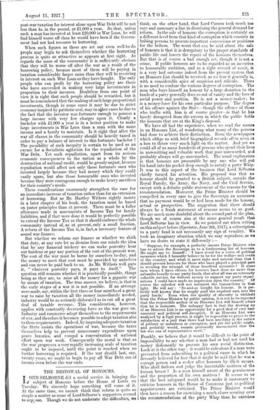DOES POSTERITY PAY 1
THE favourite excuse of those politicians and those members of the public who resist the imposition of adequate taxation for the purpose of paying for the war is the often-repeated saying that " posterity will enjoy the benefits produced by the war, and therefore posterity ought to pay a large part of the cost." This saying has been repented in the course of the present war, as in the course of previous wars, probably many thousands of times, and has generally been accepted as an obvious axiom. It is therefore a matter of real public interest when so competent a financial writer as Mr. Hartley Withers comes forward, as he has done in his new book on Our Money and the State (John Murray, 3s. net), to challenge the dictum ab initio. In making his challenge Mr. Withers frankly confesses that he had himself in some of his previous writings accepted the dictum as true, but he has come to the conclusion that it is entirely unsound. We believe that the readers of his book will be forced to the same conclusion.
His argument, briefly stated, is as follows : War requires the immediate employment of vast quantities of labour and goods. That labour can only be furnished to-day by the people of to-day ; those goods, with one small exception, must equally be furnished to-day by the people of to-day. The small exception consists of goods of a more or less permanent character, such as those steamships, steam- engines, and steel rails which are still being used directly or indirectly for military operations to-day, but were produced before the war began. So far as these goods are concerned past generations have helped to provide for the present war. As regards the rest of the material that war uses up, the whole of it must he produced to-day. The goods that posterity produces can only be consumed by posterity. So that if we fix our minds on the root fact that in the long run nothing counts but goods and services, then of necessity it is true that posterity cannot pay for the war because posterity cannot either render services or produce goods that can be used to-day. To quote Mr. Withers : " The goods consumed in war—shot, shells, rifles, food, clothes, horses, motor-lorries, wagons, ships, and everything else—have to be new and up to date, and—apart from the store of them with which the contending nations began—are made and produced as the war goes on. As they clearly have to be in existence before they can be used, it is obvious that they cannot be produced by posterity. . . . Whatever posterity produces will belong to posterity for its own use, and nothing that we can do now can deprive posterity of a single car of wheat that it sows and grows."
What then happens when a Government, instead of raising money by means of taxation to pay for the war, borrow money 1 The answer to that question partly depends on where the money is borrowed. If Great Britain borrows money from the United States, it is indeed true that our posterity will have to pay back to America the loans which we contract to-day. But that redistribution of wealth between Great Britain and the United States does not affect in the least degree the main argument as between the world of to-day and the world of to-morrow ; and as the great bulk of the borrowings of the British Government have been effected within the British Isles, it is simpler to look at the problem without bringing the United States into the picture at all. Indeed, up to the present what we have borrowed from the United States amounts to little more than, even if as much as, we have lent to our Allies and Dominions. The crucial problem is the question of internal borrowing. What happens when the Government borrow is this. Certain people who have money available lend it to the State in consideration of a pledge that they will receive interest on the loan year by year until it is finally repaid. That interest has to be provided by the taxpayers of the country, who also are responsible for the repayment of the original capital. But the lenders of the money are themselves tax- payers, and they will have to draw upon themselves as taxpayers for the interest due to them as lenders. To illustrate this point Mr. Withers takes the imaginary case of a nation composed of citizens all with the same income and taxed to the same extent. In such a case it is clear that if each citizen subscribes £100 to the loan on which he is to receive 5 per cent., he will also as a taxpayer have to pay £5 a year in order to meet the charge for interest due to himself. And when the loan falls due for repayment he or his heirs will have to provide out of taxes the exact sum of £100 which he previously subscribed as a loan. In fact, on the hypothesis taken of equal incomes and equal taxation, it is clear that State borrowing would be sheer absurdity. Whatever the lender got in the way of interest and repayment of capital he would have himself to provide in the way of taxes.
But as we all know only too well, incomes are not equal in this or iu any other country, and the case for borrowing is that the people who have a margin of income to spare can save out of that margin and lend to the Government, and thus relieve their fellow-citizens of what would otherwise be a crushing burden of immediate taxation. This is a very plausible argument until we come to examine the figures. The War Debt already created will necessitate an enormous burden of taxation for interest after the war is ended. At a rough guess we may safely say that after the war a man whose income is a thousand a year will be paying 2s. in the pound for interest upon the War Debt. That means that he will have to pay £100 a year. Therefore, unless he has himself invested at least £2,000 in 5 per cent. War Loan, he will be actually out of pocket by the transaction. Take next the case of a man with an income of £5,000 a year. At a guess we may say that his post-war taxation for interest alone upon War Debt will be not less than 4s. in the .pound, or £1,000 a year. So that, unless such a man has invested at least £20,000 in War Loan, be will find himself worse off than he would have been if the Govern- ment had not had recourse to borrowing.
When such figures as these are set out even well-to-do people may begin to ask themselves whether the borrowing process is quite so attractive as appears at first sight. As regards the mass of the community it is sufficiently obvious that they will be worse off after the war as a result of the borrowing policy, because most of them will be paying in taxation considerably larger sums than they will be receiving in interest on such War Loan as they have bought. The only people who can profit by the borrowing policy are those who have succeeded in making very large investments in proportion to their incomes. Doubtless from one point of view it is right that such people should be rewarded, but it must be remembered that the making of such large proportional investments, though in some cases it may be due to strict economy inspired by patriotic zeal, may in oper cases be due to the fact that the investor was fortunate enough to possess a large income with very few charges upon it. Clearly a bachelor with £1,000 a year is in a better position to make large investments in War Loan than a man with the same income and a family to maintain. Is it right that after the war all classes in the community should be heavily taxed in order to pay a balance of interest to this fortunate bachelor ? The possibility of such inequity is certain to be used as an excuse for a Socialistic agitation for the repudiation of the War Debt. Yet such repudiation, apart from its serious economic consequences to the nation as a whole by the destruction of national credit, would be grossly unjust, because repudiation would affect not only those fortunate ones who invested largely because they had money which they could easily spare, but also those honourable ones who invested because they were courageous enough to make heavy sacrifices for their country's needs.
These considerations enormously strengthen the case for an immediate increase of taxation rather than for an extension of borrowing. But as Mr. Hartley Withers rightly insists in a later chapter of his book, the taxation must be based on juster principles than at present. There must be a fuller allowance made in assessments of Income Tax for family liabilities, and if that were done it would be perfectly possible to extend the Income Tax so that it should embrace the whole community instead of, as at present, only a small fraction. A reform of the Income Tax is,in fact,a necessary feature of sound war finance.
But whether we reform our finance or whether we shirk that duty, at any rate let us dismiss from our minds the idea that by any financial trickery we can make posterity bear our burdens or pay any portion of the cost of the present war. The cost of the war must be borne by ourselves to-day, and the money to meet that cost must be provided by ourselves and can never be paid back to us. As Mr. Withers well puts it, " whatever posterity pays, it pays to itself." The question still remains whether it is practically possible, things being as they are, to raise all the money for a gigantic war by means of taxation. The true answer, we believe, is that in the early stages of a war it is not possible. If an attempt were made, say, within the first three or four months of a great war to raise by taxation all the money immediately needed, industry would be so seriously dislocated as to cut off a great deal of taxable revenue. This consideration, however, applies with constantly decreasing force as the war goes on. Industry and commerce adapt themselves to the requirements of war, and therefore it becomes possible to adapt taxation also to those requirements. Indeed, by imposing adequate taxation the State assists the operations of war, because the taxes themselves help to prevent unnecessary expenditure upon peace luxuries, and compel a concentration of national effort upon war work. Consequently the moral is that as the war progresses a very rapidly increasing scale of taxation ought to be imposed, until the point is reached when no further borrowing is required. If the war should last, say, twenty years, we ought to begin to pay off War Debt out of income even before the war ends.



























 Previous page
Previous page